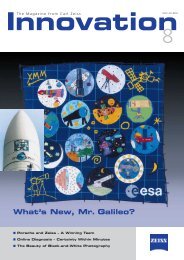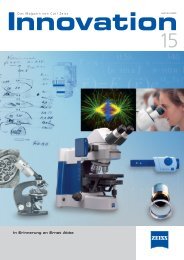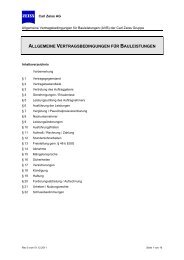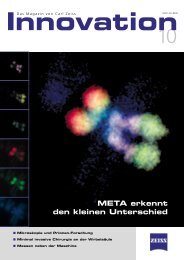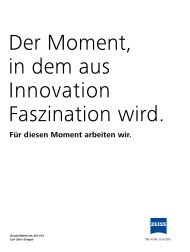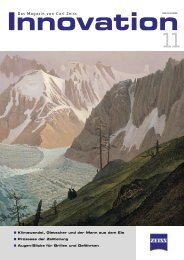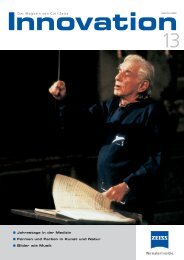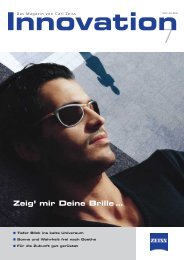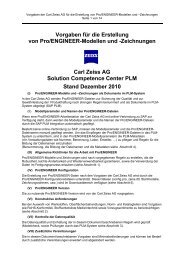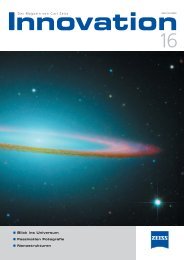Download PDF - Carl Zeiss
Download PDF - Carl Zeiss
Download PDF - Carl Zeiss
Create successful ePaper yourself
Turn your PDF publications into a flip-book with our unique Google optimized e-Paper software.
Award for NaT Working Project<br />
Fig. 1:<br />
The overjoyed winner<br />
with Dr. Ingrid Wünning<br />
from the Robert Bosch<br />
Foundation, and Karsten<br />
Schwanke, meteorologist<br />
and television presenter.<br />
Fig. 2:<br />
At the exhibition booth.<br />
Innovation 15, <strong>Carl</strong> <strong>Zeiss</strong> AG, 2005<br />
The 4 th NaT Working Symposium<br />
took place at the German Cancer<br />
Research Center in Heidelberg<br />
from February 27 to March 1,<br />
2005.<br />
Five awards were distributed among<br />
the 60 sponsored projects. The NaT<br />
Working Project, “I see what you<br />
don’t see: small and large on an expedition<br />
to the microcosm” from<br />
Birger Neuhaus and his team from<br />
the <strong>Carl</strong> <strong>Zeiss</strong> Microscopy Center<br />
from the Humboldt Exploratorium at<br />
the Museum of Natural History in<br />
Berlin finished second and received<br />
an award of 4,000 euros.<br />
1<br />
2<br />
details<br />
NaT Working<br />
The Robert Bosch Foundation initiated NaT Working.<br />
The program is intended to arouse students’ interest in<br />
natural sciences and technology. One promising way<br />
of accomplishing this is to establish and maintain<br />
personal partnerships between teachers, students and<br />
scientists and engineers active in research. Internships<br />
for students and teachers in the researchers’ labs,<br />
summer schools, student congresses or game-like<br />
practical projects during leisure time are among the<br />
sponsored activities. Particularly outstanding projects<br />
are presented with an award once a year.<br />
www.bosch-stiftung.de/natworking<br />
Humboldt Exploratorium Berlin<br />
Exploring nature and discovering new things is the<br />
greatest motivation for scientists. The Humboldt<br />
Exploratorium offers young people the opportunity<br />
of participating in the joy of scientific discovery.<br />
The Exploratorium and Humboldt University in<br />
Berlin owe their name to Alexander von Humboldt<br />
– a multi-talented natural scientist who was a<br />
geologist, zoologist and botanist in one – and his<br />
brother Wilhelm.<br />
www.humboldt-exploratorium.de<br />
www.naturkundemuseum-berlin.de<br />
49




